Lenovo ThinkSystem DE4000F review: Throwing down the gauntlet
Lenovo snuggles up with NetApp - and threatens HPE and Dell EMC in the process
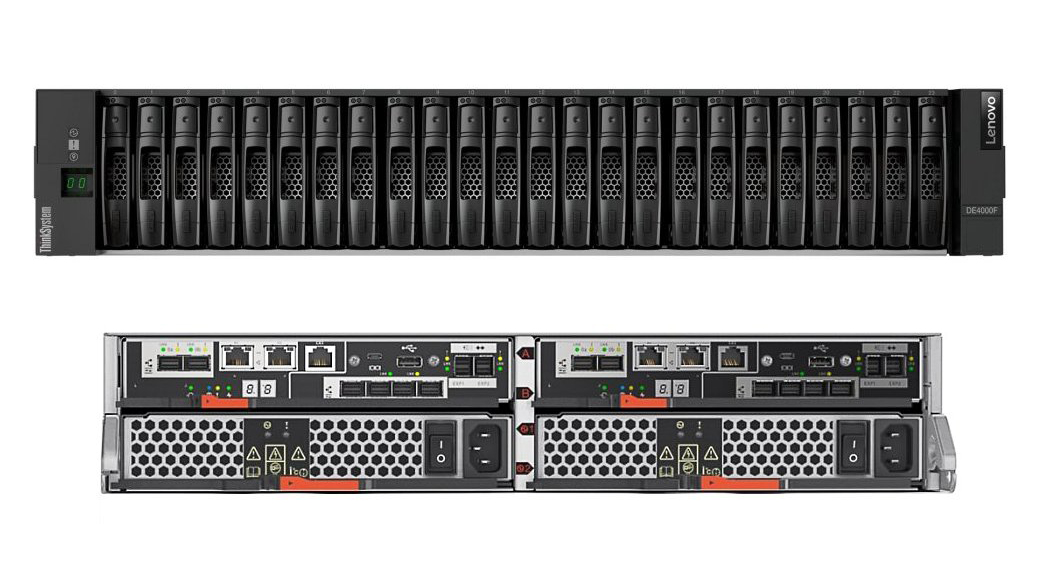
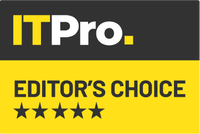
A fine partnership between Lenovo and NetApp, the ThinkSystem DE4000F delivers a great combination of all-Flash features, high availability and performance at a sensible price
-
+
Top value
-
+
Easy deployment
-
+
Very good FC SAN performance
-
+
Low latency
-
+
Plenty of expansion potential and host port choices
-
-
Heavy workloads push controller CPUs hard

Lenovo's strategic partnership with NetApp aims to move it up the enterprise storage food chain where it can compete directly with HPE and Dell EMC. The new range of ThinkSystem arrays comprises a choice selection of all-Flash and hybrid solutions, and in this exclusive review we look at the ThinkSystem DE4000F all-Flash model.
The ThinkSystem DE all-Flash family comprises two members - the high-end DE6000F and the entry-level DE4000F. They're both 2U systems employing the same dual active-active controllers with the DE6000 sporting 128GB of system memory, which is reduced to 16GB for the DE4000.
Performance-wise, the DE6000F claims a 21GB/sec read bandwidth and up to 1 million random read IOPS. The reduced system memory in the DE4000F drops these figures to 10GB/sec read bandwidth and 300,000 IOPS for random reads.
Based on NetApp's EF280 all-Flash array, the DE4000F comes preloaded with a customised version of the SANtricity System Manager software. Rebranded as ThinkSystem System Manager (TSM), this OS is designed to deliver high bandwidth, low latency and plenty of data protection features at an affordable price point.
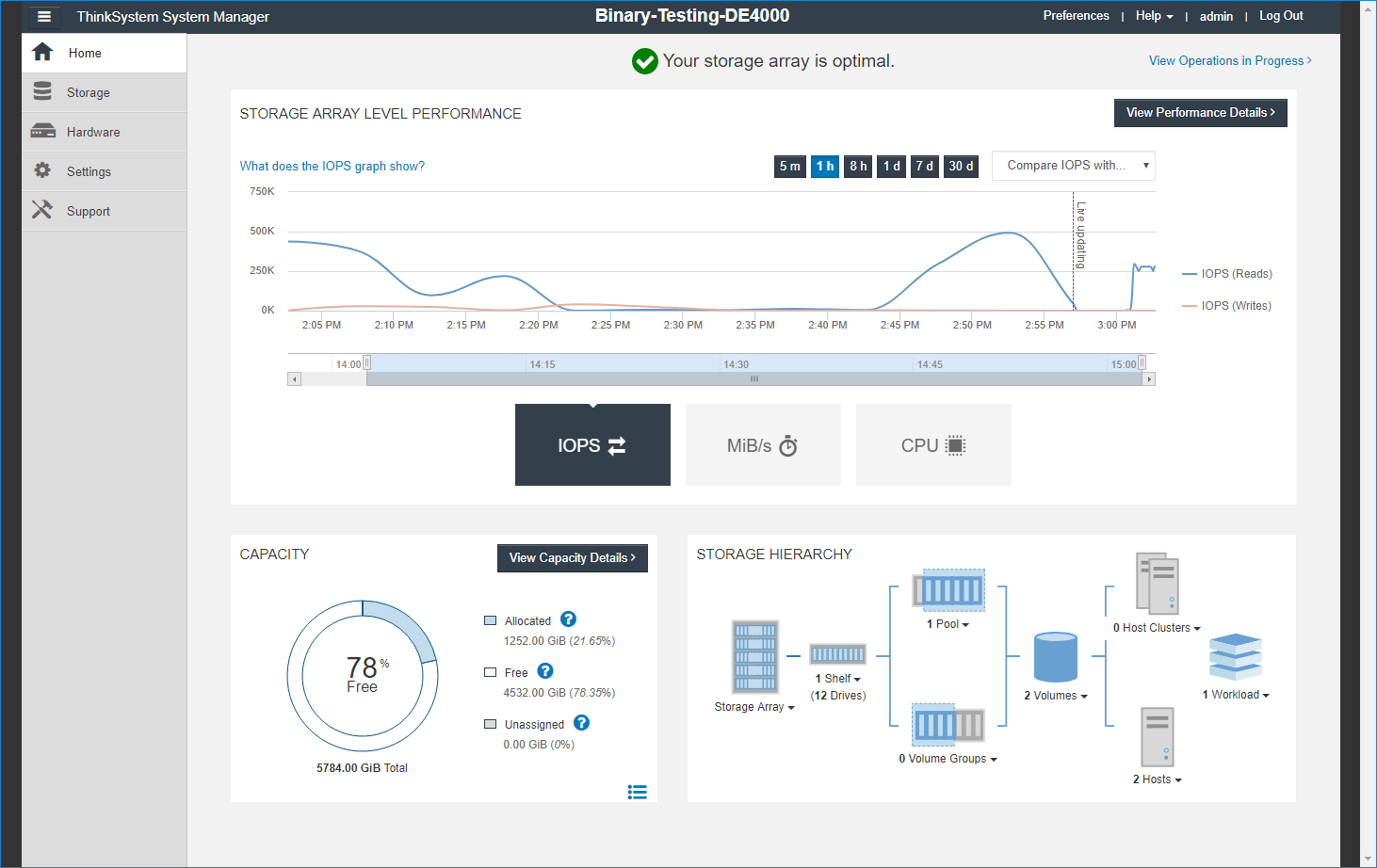
Lenovo ThinkSystem DE4000F review: Hardware
The 2U chassis provides 24 SFF hot-swap drive bays and Lenovo offers a good choice of SSDs covering a range of workloads. For testing, our review system was supplied with twelve 800GB Toshiba eMLC mixed-use SSDs.
Host interface choices are extensive as each controller comes as standard with a pair of universal SFP+ ports supporting 10GbE iSCSI or 4/8/16Gb/sec Fibre Channel (FC). We were provided with four 16Gb/sec FC transceivers and installing them automatically sets the port mode.
Each controller has an expansion slot and Lenovo offers optional 4-port SAS3, 10/25GbE, 8/16/32Gb/sec FC and universal 10GbE/16Gb/sec iSCSI/FC host interface cards (HICs). Storage expansion potential is massive: the controller's dual SAS3 ports support seven DE240S 24-bay shelves and up to 192 SSDs for a current maximum raw capacity of nearly 3PB.
Sign up today and you will receive a free copy of our Future Focus 2025 report - the leading guidance on AI, cybersecurity and other IT challenges as per 700+ senior executives
Web browser management is required to access all array features but you can also use Lenovo's SAN Manager for monitoring multiple arrays and configuring access security. The DE4000F can also be integrated into Lenovo's XClarity Administrator which provides hardware inventory and monitoring but not auditing or firmware upgrade services for any NetApp-based array.
Lenovo ThinkSystem DE4000F review: Deployment and features
Installation is swift and the TSM wizard guided us easily through setting the array up. These steps included naming the array, using recommended settings for pool creation, declaring existing hosts, enabling Lenovo's AutoSupport and remote diagnostics services and adding email alerting.
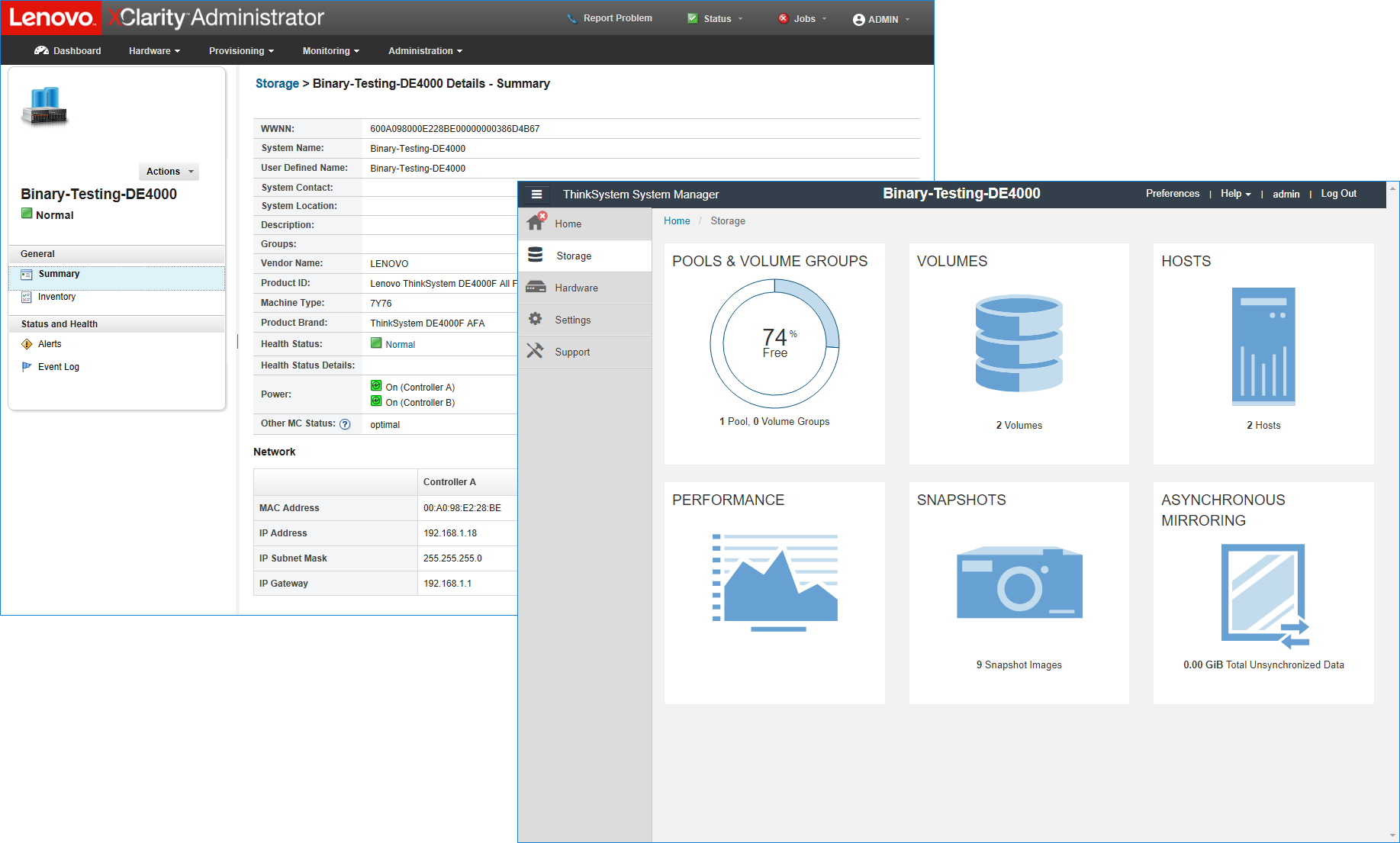
The TSM's home page reveals a big performance graph for IOPS, MB/sec or controller CPU utilization for periods ranging from 5 minutes to 30 days. Below is a pie chart for storage usage while next door is a handy hierarchical view of your storage infrastructure.
Dynamic disk pools (DDPs) offer a lot more than standard volume groups as they apply RAID6 protection across a minimum of 11 SSDs and distribute spare capacity across them all for faster rebuilds should a member fail. Other advantages of DDPs are they apply global thin provisioning and offer options to add or remove up to 60 SSDs from the pool on demand.
Scheduled snapshots come as standard with support for up to 512 and you can mirror volumes using up to 32 pairs. Asynchronous mirroring allows volumes to be mirrored to another storage array while the optional synchronous mirroring feature replicates volumes in real time for continuous availability.
Our FC host ports were auto-discovered as soon as they were connected to the array and when we created entities for each one in TSM, we could choose from a list of common host OSes. Volume creation is helped along nicely as you can choose from a large list of typical workloads so they are automatically configured with the most appropriate settings.
Lenovo ThinkSystem DE4000F review: FC performance
As the array was only supplied with dual 16Gb/sec FC ports per controller we had to use non-redundant host connections to see what the best performance was. The system employs ALUA (asymmetric logical unit access) so an MPIO link across both controllers won't double performance as only the primary link is optimized while the secondary link is non-optimized and reserved for failover.
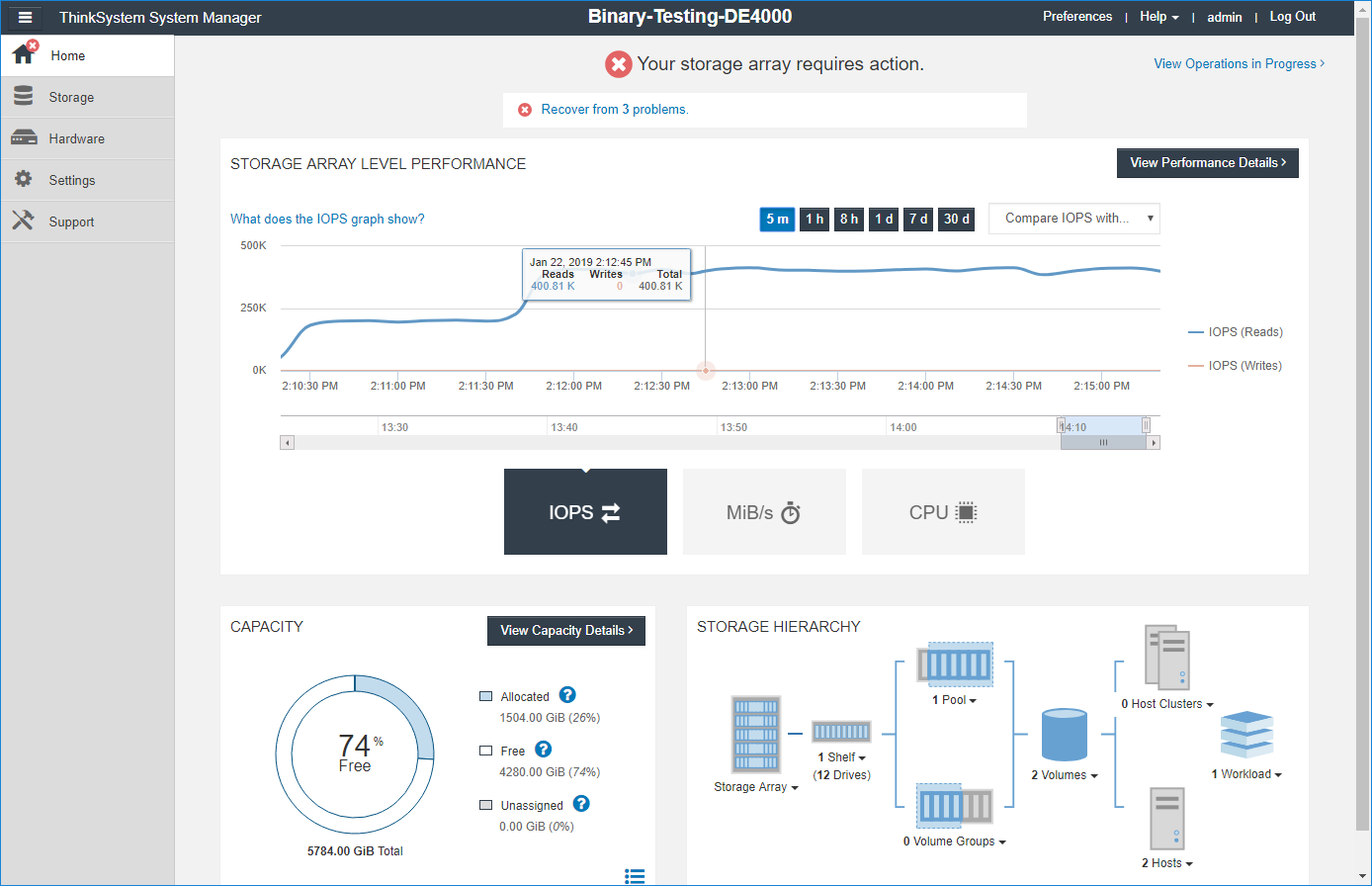
We used a pair of Xeon Scalable Windows servers equipped with dual-port QLogic QLE2672 FC cards and to get full 32Gb/sec MPIO links, we connected each server to both ports on separate controllers and provisioned dedicated volumes. This gave us two optimized paths per server although TSM did warn us that the links weren't redundant.
With Iometer running on both hosts, we saw cumulative sequential reads and writes using 4KB blocks of 572,500 and 124,000 IOPS while for random operations, we recorded 401,000 and 52,200 IOPS. We did notice the TSM CPU performance graph showing utilization peaking at up to 100 percent during these high workload tests. Even so, our random read IOPS results are 33 percent better than Lenovo's quoted throughput.
General performance is also impressive as we saw top cumulative sequential read and write speeds for our two servers of 49Gbits/sec and 31Gbits/sec. Swapping to random operations returned total read and write rates of 49Gbits/sec and 23.3Gbits/sec and for all tests, latency never went higher than 19ms.
Lenovo ThinkSystem DE4000F review: Verdict
This huge product launch is a wake-up call to HPE and Dell EMC as it puts Lenovo on a firm footing with them in the mid-range and enterprise storage markets. We were impressed with the ThinkSystem DE4000F as it offers an affordable entry-level all-Flash solution with good FC performance and all the benefits of NetApp's behind-the-scenes storage expertise.
Dave is an IT consultant and freelance journalist specialising in hands-on reviews of computer networking products covering all market sectors from small businesses to enterprises. Founder of Binary Testing Ltd – the UK’s premier independent network testing laboratory - Dave has over 45 years of experience in the IT industry.
Dave has produced many thousands of in-depth business networking product reviews from his lab which have been reproduced globally. Writing for ITPro and its sister title, PC Pro, he covers all areas of business IT infrastructure, including servers, storage, network security, data protection, cloud, infrastructure and services.
-
 CISA’s interim chief uploaded sensitive documents to a public version of ChatGPT – security experts explain why you should never do that
CISA’s interim chief uploaded sensitive documents to a public version of ChatGPT – security experts explain why you should never do thatNews The incident at CISA raises yet more concerns about the rise of ‘shadow AI’ and data protection risks
By Ross Kelly Published
-
 Former Google engineer convicted of economic espionage after stealing thousands of secret AI, supercomputing documents
Former Google engineer convicted of economic espionage after stealing thousands of secret AI, supercomputing documentsNews Linwei Ding told Chinese investors he could build a world-class supercomputer
By Emma Woollacott Published
-
 OpenAI admits 'losing access to GPT‑4o will feel frustrating' for users – the company is pushing ahead with retirement plans anway
OpenAI admits 'losing access to GPT‑4o will feel frustrating' for users – the company is pushing ahead with retirement plans anwayNews OpenAI has confirmed plans to retire its popular GPT-4o model in February, citing increased uptake of its newer GPT-5 model range.
By Ross Kelly Published
